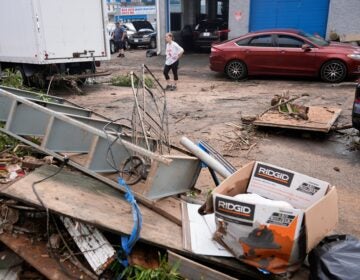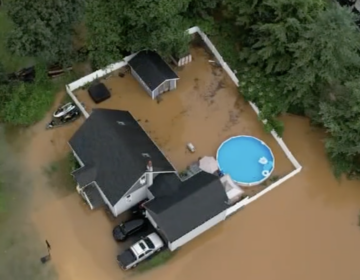NJ drinking water panel delays action on PFOA till August

Chemical structure of perfluorooctanoic acid
With rising fears about the presence of toxins in drinking water, local advocates say the scientific panel that is charged with recommending safety standards for New Jersey’s drinking water may be dragging its feet.
The Drinking Water Quality Institute (DWQI) put off recommending a safe limit for the presence of a particular toxic chemical in drinking water on Thursday, saying it needed more time to evaluate its health effects. The chemical, PFOA — perfluorooctanic acid –once used in nonstick cookware, carpets, and clothing, and which is now present in some public water systems, has been the subject of a year-long investigation by the DWQI.
The institute, a scientific panel that advises the Department of Environmental Protection (DEP) in New Jersey, was expected to release its findings this week. Instead, it met in closed session and said it would recommend a safe level of PFOA on its website in August.
After a 30-day public comment period, the panel will send its recommendation for a Maximum Contaminant Limit (MCL) to DEP Commissioner Bob Martin. By setting a MCL for PFOA, the state could step up its control of the chemical through regulation.
The chemical, which the U.S. Environmental Protection Agency (EPA) calls a likely carcinogen, has been found in 12 New Jersey water systems at or above a “guidance” level set by the DEP in 2009.
Advocates questioned why the group had to meet in private and complained about another delay. Dr. Keith Cooper, a Rutgers University toxicologist who chairs the DWQI, said during the public portion of the meeting that it was necessary to also hold a closed session to evaluate the findings of three subcommittees (on health effects, detection, and treatment), and so that members could speak freely.
The panel has met in closed session before, Cooper said. “In reality, we can go into closed session any time we want.”
He said the investigation of PFOA has been delayed because of the difficulty of coordinating the schedules of its members — who include academics, water company executives, and state officials, and are all volunteers.
Environmental advocates often accuse the DWQI of moving slowly on urgent matters of public health, and note that it did not meet for almost four years between 2010 and 2014 because of what they say was a “shutdown” by the Christie administration.
Tracy Carluccio, deputy director of the environmental group Delaware Riverkeeper Network, said the public has been waiting for the DWQI to make its recommendation on PFOA for a year, and that officials who run public water systems are anxiously awaiting state action on the issue.
“We were expecting this today,” said Carluccio, whose organization has been an outspoken advocate for control of PFCs, the family of chemicals to which PFOA belongs. “This is a huge issue, and a lot of pressure is coming from the community to water systems to make sure they are providing safe drinking water.”
The EPA found PFOA and other types of the PFC family of chemicals in 88 New Jersey water systems in 2014-2015, Carluccio said.
“We don’t know why the report has been held up but the problem that we see is that it delays action,” she said. “We don’t have a comfort level with this because we’ve seen so much delay over the years.”
Carluccio praised the panel for its recommendation on PFNA, a related chemical, in 2015, but said the DEP has yet to act on that measure.
The DWQI also met to hear an update on research into 1,2,3 TCP, another potentially carcinogenic chemical that was inconclusively reviewed by the panel in 2009, and which is now subject to another evaluation following a request by Commissioner Martin of the DEP.
TCP, which is used in products such as pesticides, degreasers and varnish removers, is also described by the EPA as a likely carcinogen. In 2015, the state legislature passed a bill that would require the DWQI to set a drinking water limit for the chemical, and for the DEP to adopt that limit within 180 days.
Laura Cummings, an outgoing panelist, said a subcommittee had decided to recommend that the DWQI readopt the same standard it had recommended in 2009. The DWQI plans to post its recommendation on TCP for public comment in about two weeks time.
In an apparent attempt to deflect any accusations of secrecy in the DWQI’s work, Cooper gave a detailed presentation about the its operations, explaining how it gathers information, seeks public input, and makes its recommendations to the DEP. He updated about a dozen members of the public attending the meeting with the panel’s work on PFOA, which he said had caused “100 percent mortality” among rodents used for testing, and was especially toxic for human infants.
“These compounds are among a whole group we need to be worried about,” Cooper said.
Attempting to dissociate himself from any controversy over regulation of chemicals, Cooper said the panel works on a strictly scientific basis, and avoids all policy decisions.
“We don’t have a dog in this fight,” he said. “The only thing we are interested in is good science.”
________________________________________________________________
NJ Spotlight, an independent online news service on issues critical to New Jersey, makes its in-depth reporting available to NewsWorks.
WHYY is your source for fact-based, in-depth journalism and information. As a nonprofit organization, we rely on financial support from readers like you. Please give today.




